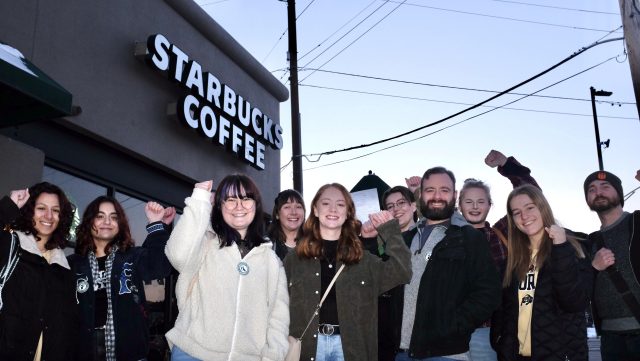
We had “Hot Labor Summer” across the country, and working-class discontent continues to smolder. Health care employees, flight attendants, pilots, television and film writers and actors are either on strike or threatening to strike amid labor agreement negotiations. Workers at Amazon and Starbucks have won amazing victories despite the companies’ multi-million dollar campaigns to intimidate and harass them. During an inaugural “State of the Unions” address on Aug. 29, AFL-CIO president Liz Shuler said there have been more than 200 strikes so far in 2023, 10 times more than there were two years ago. She partly blamed “corporate greed and inequality.”
AFL-CIO’s “Executive Paywatch” found that the average pay for a CEO of an S&P 500 company in 2022 was $16.7 million, more than 270 times the amount the average worker earned.
As part of her speech, Shuler discussed findings from a national poll of registered voters that showed two-thirds of Americans support unions, with voters under 30 showing “near universal approval” at 88%.
The U.S. Treasury recently released a first-of-its-kind report by its Office of Economic Policy on the benefits of unions to the U.S. economy. Here are some of the findings:
“Middle-class workers reap substantial benefits from unionization. Unions raise the wages of their members by 10%-15%. Unions also improve fringe benefits and workplace procedures such as retirement plans, workplace grievance policies and predictable scheduling.”
“Unionization also has spillover effects that extend well beyond union workers. Competition means workers at nonunionized firms see increased wages too. Heightened workplace safety norms can pull up whole industries. Union members improve their communities through heightened civic engagement; they are more likely to vote, donate to charity and participate in a neighborhood project.”
The report also cited research showing that “unions serve to reduce race and gender wage gaps” and can even “boost businesses’ productivity by improving working environments and by giving experienced workers more of an input into decisions that design better and more cost-effective workplace procedures.”
In 2021, the Economic Policy Institute released a report showing that “high unionization levels are associated with positive outcomes across multiple indicators of economic, personal, and democratic well-being.” The 17 U.S. states with the highest union densities have higher wages, fewer people without health insurance and more legislation protecting both sick leave and family and medical leave.
Those states are also more supportive of the U.S. being a genuine democracy. Recently, sustained attacks on the right to vote (particularly for people of color) have destabilized America. The right to vote is essential for a vibrant and functioning democracy. Unions have been a crucial force in defending this right from the beginning. The report notes:
“Significantly fewer restrictive voting laws have been passed in the 17 highest-union-density states than in the middle 17 states (including D.C.) and the 17 lowest-union-density states. Over 70% of low-union-density states passed at least one voter suppression law between 2011 and 2019.”
In 2021, after the Trump years and the Jan. 6 insurrection, the respected Stockholm-based think-tank International Institute for Democracy and Electoral Assistance added the U.S. to a list of “backsliding democracies” for the first time.
“Knocked down a significant number of steps on the democratic scale,” their report said.
Currently polling indicates that the 2024 election will be close. A united front against fascism needs to be built out of the center-left coalition that already exists. In the spring of 2020, the Biden and Sanders camps formed several issue task forces that influenced the legislation that Biden would introduce. The proposals were unfortunately chopped up due to obstruction by the GOP and two conservative Democratic senators. Nevertheless, Biden has an impressive record of progressive accomplishment.
More needs to be done. Progressive Democrats have introduced bills on a wide variety of issues that go beyond what Biden supports.
Meanwhile, Biden’s appointees are making a difference at the National Labor Relations Board.
In August, the board ruled in a party-line vote that when a majority of a company’s employees file union affiliation cards, the employer can either voluntarily recognize their union or, if not, run a union recognition election. If the company commits an illegal labor practice, the employer has to immediately recognize the union and begin bargaining. Since employers routinely break the law (like firing union activists) and drag things out, this is a game changer.
It’s a good beginning.
This opinion does not necessarily reflect the views of Boulder Weekly.














